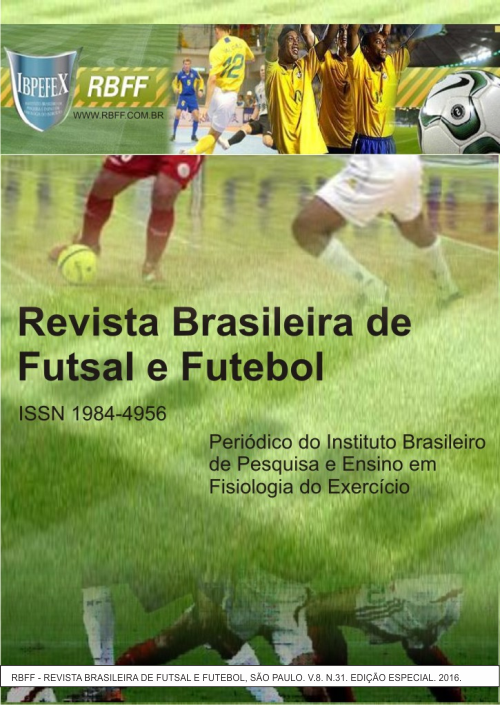Improvement statement of use performance motor boys in skills of futsal
Abstract
The aim of this study was to verify the influence of demonstrations in performing specific motor skills of soccer indoor in twenty-two male students with mean age 6,90 ± 0,68 years. Two tests were conducted (Wall Volley Test e Soccer Dribble Test). The results showed that both groups improved performance, between tests (p=0,00). However, no differences between two groups were found. The results showed advantages of demonstration in physical education classes. Thus, it highlights the importance of adequate methods for teaching soccer indoor.
References
-Al-Abood, S. A.; Bennett, S. J.; Hernandez, F. M.; Ashford, D.; Davids, K. Effect of verbal instructions and image size on visual search strategies in basketball free throw shooting. Journal of Sports Sciences. Vol. 20. Núm. 3. p. 271-278. 2002.
-Al-abood, S. A.; Davids, K.; Bennett, S. J. Specificity of task constraints and effects of visual demonstrations and verbal instructions in directing learners' search during skill acquisition.Journal of Motor Behavior. Vol. 33. Núm. 3. p. 295-305. 2001.
-Andrieux, M.; Proteau, L. Observation learning of a motor task: who and when?Experimental brain research. Vol. 229. Núm. 1. p. 125-137. 2013.
-Austin, S.; Miller, L. An empirical study of the SyberVision golf videotape. Perceptual and Motor Skills. Vol. 74. Núm. 3. p. 875-881. 1992.
-Badets, A.; Blandin, Y. Feedback schedules for motor-skill learning: the similarities and differences between physical and observational practice. Journal of Motor Behavior. Vol. 42. Núm. 4. p. 257-268. 2010.
-Blandin, Y.; Lhuisset, L.; Proteau, L. Cognitive processes underlying observational learning of motor skills.The Quarterly Journal of Experimental Psychology: Section A. Vol. 52. Núm. 4. p. 957-979. 1999.
-Bruzi, A.; Palhares, L.; Fialho, J.; Benda, R.; Ugrinowitsch, H. Efeito do número de demonstrações na aquisição de uma habilidade motora: um estudo exploratório. Revista portuguesa de ciências do desporto. Vol. 6. Núm. 2. p. 179-187. 2006.
-Ennes, F. C. M.; Bruzi, A. T.; Vieira, M. M.; Dutra, L. N.; Ugrinowitsch, H.; Benda, R. N.A demonstração e a instrução verbal na aquisição de habilidades esportivas. Rev Min Educ Fís. Vol. 16. Núm. 1. p. 108-133. 2008.
-Fairbrother, J. T. Fundamentals of motor behavior, Human Kinetics. 2010.
-Field, A. Descobrindo a estatística usando o SPSS, Bookman. 2009.
-Janelle, C. M.; Champenoy, J. D.; Coombes, S. A.; Mousseau, M. B. Mechanisms of attentional cueing during observational learning to facilitate motor skill acquisition. Journal of Sports Sciences. Vol. 21. Núm. 10. p. 825-838. 2003.
-McAble, J. F.; McArdle, W. D.Team sports skill test an introduction to measurement in physical education. H. J. Montoye, Allym e Bacon. 1978.
-McCullagh, P.; Caird, J. Correct and learning-models and the use of model knowledge of results in the acquisition and retention of a motor skill.Journal of Human Movement Studies. Vol. 18. Núm. 3. p. 107-116. 1990.
-Pollock, B. J.; Lee, T. D. Effects of the model's skill level on observational motor learning.Research quarterly for exercise and sport Vol. 63. Núm. 1. p. 25-29. 1992.
-Públio, N. S.; Tani, G.; Manoel, E. D. J. Efeitos da demonstração e instrução verbal na aprendizagem de habilidades motoras da ginástica olímpica. Revista paulista de educação física. Vol. 9. Núm. 2. 1995.
-Santos, E. B.; Silva, M. C. R.;Katzer ,J. I.; Flôres, F. S.; Corazza, S. T. Efeitos da modelagem na aprendizagem da habilidade do chute em meninas.Revista Brasileira de Ciência e Movimento. Vol. 23. Núm. 4. p. 57-63. 2015.
-Schmidt, R.; Wrisberg, C. Aprendizagem e Performance Motora: Uma abordagem da aprendizagem baseada na situação. Porto Alegre. ARTMED. 2010.
-Schmidt, R. A.; Lee, T. Motor control and learning. Human kinetics. 1988.
-Shafizadeh, M.; Platt, G. K.; Bahram, A. Effects of focus of attention and type of practice on learning and self-efficacy in dart throwing. Perceptual & Motor Skills. Vol. 117. Núm. 1. p. 182-192. 2013.
-Shea, C. H.; Wright, D. L.; Wulf, G.; Whitacre, C. Physical and observational practice afford unique learning opportunities. Journal of motor behavior. Vol. 32. Núm. 1. p. 27-36. 2000.
-Silveira, S. R.; Basso,L.; Freudenheim, A. M.; Corrêa, U. C.; Ferreira, M. G.; Tani, G. Aquisição da habilidade motora rebater na educação física escolar: um estudo das dicas de aprendizagem como conteúdo de ensino. Revista Brasileira de Educação Física e Esporte. Vol. 27. Núm. 1. p. 149-157. 2013.
-Tani, G.; Bruzi, A. T.; Bastos, F. H.; Chiviacowsky, S. O estudo da demonstração em aprendizagem motora: estado da arte, desafios e perspectivas. Rev Bras Cineantropom Desempenho Hum. Vol. 13. Núm. 5. p. 392-403. 2011.
-Tonello, M. G. M.; Pellegrini, A. M.A utilização da demonstração para a aprendizagem de habilidades motoras em aulas de Educação Física. Rev Paul Educ Fís Vol. 12. Núm. 2. p. 107-114. 1998.
-Van den Tillaar, R.; Ettema, G. Influence of instruction on velocity and accuracy of overarm throwing. Perceptual and motor skills. Vol. 96. Núm. 2. p. 423-434. 2003.
-Wulf, G.; Mornell, A. Insights about practice from the perspective of motor learning: a review.Music Perform Res. Vol. 2. p. 1-25. 2008.
-Wulf, G.; C. Shea; R. Lewthwaite."Motor skill learning and performance: a review of influential factors." Medical education. Vol. 44. Núm. 1. p. 75-84. 2010.
Authors who publish in this journal agree to the following terms:
- Authors retain the copyright and grant the journal the right of first publication, with work simultaneously licensed under the Creative Commons Attribution License BY-NC which allows the sharing of the work with acknowledgment of the authorship of the work and initial publication in this journal.
- Authors are authorized to enter into additional contracts separately for non-exclusive distribution of the version of the work published in this journal (eg, publishing in institutional repository or book chapter), with acknowledgment of authorship and initial publication in this journal.
- Authors are allowed and encouraged to post and distribute their work online (eg, in institutional repositories or on their personal page) at any point before or during the editorial process, as this can bring about productive change as well as increase impact and impact. citation of published work (See The Effect of Free Access).





